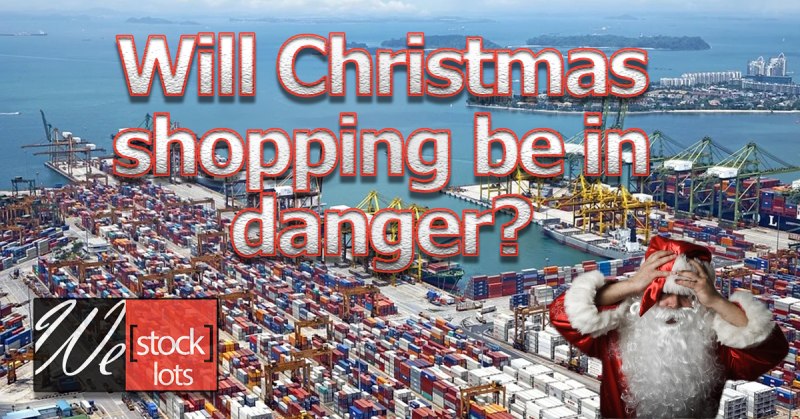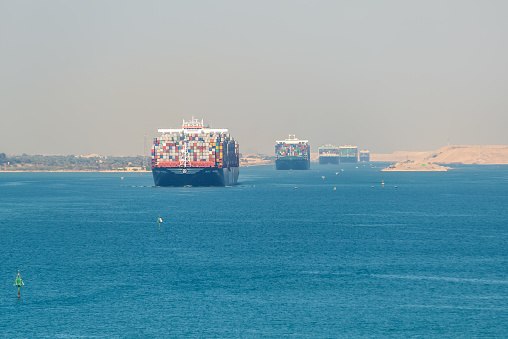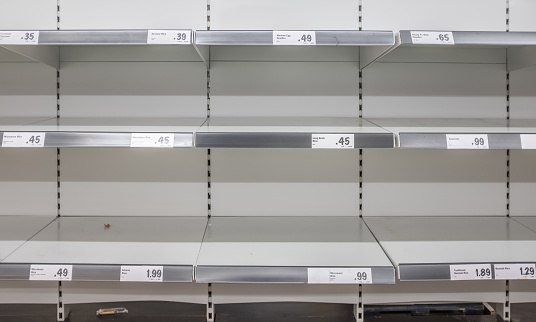Will Christmas shopping be in danger?
There is happening a lot in the world trade market right now: Enormous freight rates, congestion of container ships, closed harbours due to Covid cases and many more. Will this lead to empty shelves for Christmas? We give you a small inside in what's happening!
“Everything that can go wrong is going wrong at the same time.” These are the words of MGA Entertainment CEO and founder Isaac Larian about the current situation in the world trade market [1]. But what is exactly going wrong? And how will it affect you as a consumer or your business? We will explain briefly what is happening in the global trading market right now and what else might happen next.
Support measures from the governments in response to the Covid restrictions led to a stop to the rise of unemployment and bankruptcies. It should be two positive signals for consumer confidence and the willingness to buy but why do these two indicators show a decrease [2]? That's the result of some factors which could explain why some experts are warning us that Christmas shopping might be in danger...
The huge rise in container prices
Although Covid restrictions worldwide are lifted more and more, the aftermath of it is still underway. A very tangible example of this is the very high container price. Some causes that led to this strong rise are the blockage of the Suez Canal in March, the decrease in the import of containers in China due to European lockdowns, a shortage of capacity in sea transport and the closure of two important Chinese harbours due to Covid cases. The costs of shipping a 40ft container from China to Europe in November 2020 were around € 1.700,-, right now the price is somewhere near € 12.500,-, an enormous increase [3]! Companies who buy products in China are hit hard by this enormous rise and expectations are that they will pass on the higher costs to the consumer.
Example
A company buys garden furniture in China. You can put four pieces on one pallet and in a 40ft container, you can place 25 pallets. So this means you can ship 100 sets in one container. In November 2020 the company paid around €17,- per set. Right now, it costs around €125,- to ship one set from China to Europe. A huge difference that most likely will be paid by the consumer. Companies will also ask themselves if it's viable this way; will the consumer accept the higher price?
Inflation
The fact that prices of consumer goods will rise further in the upcoming months seems inevitable while inflation in the Eurozone has reached its highest point in ten years. Where does this inflation come from? It is partly due to the various lockdowns that have been lifted around the world. The demand for goods increased strongly while the factories couldn't match this demand due to earlier mentioned causes. The fact that this rapidly rising inflation is leading to lower consumer confidence and a lower willingness to buy is because the end of this inflation does not seem to be in sight yet [4]. Statements of some experts don't seem to help either...
Enormous congestion of container ships
In America (and also in Europe) experts warn consumers that they need to do Christmas shopping early this year to prevent empty shelves and higher prices. The fear of empty shelves is not entirely unfounded. There is huge congestion of container ships in several harbours in China (but also Rotterdam and Los Angeles for example) due to Covid cases, shortage of staff and a typhoon which afflicted some important Chinese harbours [5].
The congestion looks like a vicious circle that won't end soon as it seems. The Chinese government decided to cut power in at least ten different Chinese provinces, causing many factories to shut down (partly). The shutdown means another setback for worldwide trade because there are also important harbours in the particular provinces. The timing of the shutdown is also unlucky as this period normally is the busiest period for harbours worldwide. Therefore, the congestion of container ships will also further increase and the delivery time of products coming from China will also grow.
Shortage of truck drivers
A new problem occurs when containers (finally) arrive in Europe, the shortage of truck drivers all over the continent. The empty shelves and empty gas stations in the United Kingdom do not stand alone. The shortage of truck drivers is also an increasing problem on the European mainland. Partly because truck drivers found new jobs after the Covid restrictions and on the other hand the ageing of truck drivers.
The average age of a European truck driver is 44 years old and due to high work pressure and a bad image, the sector has a hard time finding new, young drivers. In 2019, 24% of the vacancies for truck drivers in the United Kingdom wasn't filled. The percentages from several European countries also show that it's not only a problem in the UK. Poland was on 22% in 2019, the Czech Republic had a percentage of 21% and Spain had a shortage of 20%. The expectations are that these percentages will further increase coming months and years [6].
Taking the production of goods back to Europe
Is there a solution for the long-term? Some big Dutch retail stores think they have. They have started to take the production of goods back to Europe, partly because of the high transport costs but also because of the higher prices of raw materials, shorter delivery times and to reduce carbon emission. The CEO of Zeeman (a major Dutch discount store) Erik-Jan Mares states in the FD that he expects that the whole retail sector will produce closer to home in the upcoming years [7]. It is not a solution for the short-term but it could make an impact in the long run.
Are we really going to have empty shelves for Christmas?
In our surroundings, we also see and hear signals of the problems everybody is facing at the moment. Products become more expensive, suppliers ask more for their products and the demand for products is high because customers also see what's happening right now. Our director and purchase manager Branco Brouwers about our findings: ''In the last year and a half, we saw various fluctuations in the number of offers we received from our suppliers. Companies choose to act carefully as the future is uncertain at this point, the market prices fluctuate and the prices of resources are unpredictable. Besides that, we notice that our customers are preparing for the gift season because they buy products out of stock where normally this happens later in the year.''
This phenomenon could lead to emptier shelves for Christmas, especially for product categories that are demanded in the gift season. The owner of a British toy company also stated that the rising delivery times could bring the sale of toys in danger in November and December. He normally reorders popular toys in October, but that's now impossible due to the trade market's problems [8].
Should you panic? No. Is the situation a bit worrying? Yes, a bit. There is enough stock in Europe at the moment but the chance of empty shelves for product categories like toys is real. If you don't want to end empty-handed or with your third choice gift, just buy your first choice gift a little earlier than the day before Christmas. You can also contact your favourite business to ask for expected delivery times. The more you know, the better!
Hopefully, the many problems will stabilize soon, nobody wants longer delivery times, higher prices and empty shelves. The future might seem uncertain but that could also be an opportunity. We will keep a close eye on this subject so we can respond quickly to changes that might occur.
[1] https://www.businessinsider.com.au/kids-lose-out-2021-holiday-shopping-supply-chain-issues-2021-10
[2] https://www.businessinsider.nl/consumenten-vertrouwen-september-2021/
[3] https://www.rtlnieuws.nl/economie/business/artikel/5249730/speelgoed-action-duurder-prijsstijgingen-zeecontainers-vervoer
[4] https://www.businessinsider.nl/inflatie-augustus-2021-sparen-rente/
[5] https://www.nt.nl/scheepvaart/2021/09/17/tyfoon-weg-congestie-blijft-koop-nu-kerstcadeaus/?utm_source=ntemail&utm_medium=nieuwsbrief&utm_campaign=ntemail&gdpr=accept
[6] https://www.politico.eu/article/europes-looming-truck-driver-shortage-trucker-haulier-brexit-hgv/
[7] https://fd.nl/ondernemen/1409804/winkelketens-halen-productie-terug-uit-azie
[8] https://www.huffingtonpost.co.uk/entry/christmas-food-shortages-turkey-trees_uk_61518842e4b06beda471797



